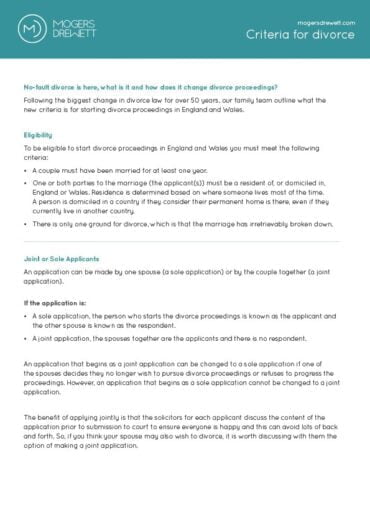Postnuptial and prenuptial agreement solicitors
When you are getting married or newlywed, the thought of separating probably isn’t at the front of your mind. But getting protection in place in case things do not go to plan gives you the assurance you need to start your new life without fear of the future.
Our expert family lawyers see prenuptial agreements and postnuptial agreements as just another form of marriage preparation. Putting an agreement in place protects you and your spouse should your relationship end. And if it does, your agreement helps you part ways amicably and with security.
What is a prenuptial agreement?
A prenuptial agreement is an agreement signed before the wedding ceremony. Ideally, it should be signed at least 21 days prior to the wedding. But it can be done at any time.
The agreement defines who owns what while you and your partner are married. It also usually sets out a plan for what will happen if you separate or divorce.
What is a postnuptial agreement?
A postnuptial agreement sets out the same protection as a prenuptial agreement, but is signed after the wedding ceremony (at a point when the couple still plans on staying together).
It is always advisable to put a prenuptial agreement in place if you can. If this is not possible, a postnuptial agreement is strongly encouraged.
Why are prenuptial and postnuptial agreements important?
In the best case scenario, your agreement will never be needed.
In the worst case scenario, it may save you the emotional and financial drain of contested court proceedings.
The civil partnership equivalents serve the same purpose and are referred to as ‘pre-civil partnership agreements’ and ‘post-civil partnership agreements’.
Next steps: Get in touch to discuss prenuptial and postnuptial agreements
Get quick answers to some frequently asked questions below, or contact our post- and prenuptial agreement solicitors for a confidential no-obligation conversation on: 0800 533 5349 or enquiries@mogersdrewett.com
Meet the team
Frequently asked questions
If one or both of you has significant wealth or assets, it is definitely worth considering a prenuptial agreement.
You might also choose to have an agreement in place if either of you is already divorced and wants to protect assets for any children from a previous marriage.
Marital agreements are not legally binding in court, but will be given considerable weight providing they:
- Attempt to be fair
- Acknowledge the existence of children
- Are signed without pressure, fraud or misrepresentation
- Are signed with parties having had independent legal advice and exchanged full financial disclosure
- Are discussed and signed at least 21 days before the wedding (in the case of a prenuptial)
If spouses cannot come to an agreement about division of property, assignment or responsibilities or any other arrangement, those matters are left to the court if no prenuptial agreement exists.
This is possible, but it is dependent on what the other circumstances of your case are and what might be offset in order for you to ringfence your business.
Yes, you do. The UK Law Commission requires both parties to seek professional legal consultancy from separate, independent lawyers to draft and enter into a prenuptial or postnuptial agreement.
Couples throughout Bath, Wells, Sherborne and Frome rely on and recommend the family lawyers at Mogers Drewett Solicitors to draft clear, fair and comprehensive prenuptial and postnuptial agreements.
Once agreed, a prenuptial agreement cannot be changed after marriage. But you can also set up a postnuptial agreement that lays out new terms, even if you already have a prenuptial agreement in place.
Prenuptial and postnuptial agreements last for the full duration of your marriage.
Similarly, pre-civil partnership agreements and post-civil partnership agreements last for the full duration of your civil partnership.
You can’t use a prenuptial agreement to make decisions about:
- Child custody, including visitation, schooling or religious upbringing
- Child support
- Personal and lifestyle matters
Prenuptial agreements (as well as their postnuptial and civil partnership equivalents) are mainly financial, detailing the allocation of wealth and assets following separation. But they can contain pretty much anything you want them to.
Matters commonly protected by prenuptial agreements include:
- Assets owned prior to marriage
- Assets from a previous marriage that you want to leave to children
- Controlling ownership of a business
- Property held in your sole name or in joint names
- Expected inheritance
- Bank savings
- Trust funds
- Stocks and shares
- Future income
- Pension pots
Putting a prenuptial agreement in place lets you:
- Clearly define ownership of finances and assets between partners
- Have peace of mind regarding how your finances will be divided if your relationship ends
- Minimise acrimony in divorce, as there can be no argument or bitterness over ownership
- Protect your business assets, and prevent disruptions to business that might otherwise be caused by contested ownership
- Ringfence other notable assets like gifts from third parties and sentimental possessions such as family heirlooms
- Save money, as setting up a prenuptial agreement is typically much cheaper than litigation





